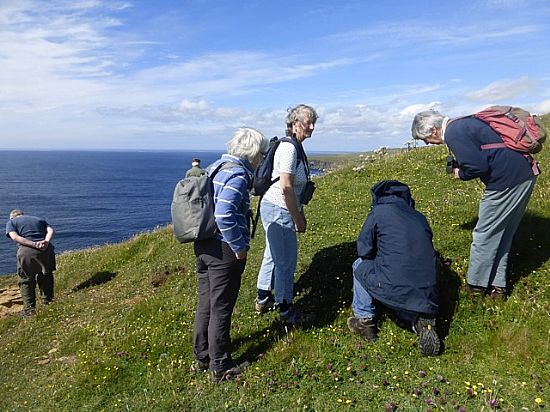Members, please make submissions to info@orkneyu3a.org
Botany Group - 2nd August Outing
by Jenny - 17:47 on 09 August 2016
Botany Group – 2nd August 2016
by Jenny
On a bright sunny afternoon, the Botany Group walked up the hill to the coastguard hut at the top of Black Craig and then down towards the cliffs where we found areas of very short vegetation, amongst which the stars were perhaps the eyebrights, Field Gentians, Grass of Parnassus and the tiny Frog Orchids, but there were many other plants to be found there too. These are patches of ground where it pays to get down at ground level and look at the wonderful mosaic of small plants that are growing together. The views along the coast and out to sea were also much enjoyed.
Heading back up towards the 'summit' again, John showed us the Crested Hair Grass he had seen earlier in the year and then we searched for and found the patch of tiny Adders Tongue. As the weather changed and the wind freshened we made our way back to the cars having enjoyed seeing some lovely plants in the best of the weather for the day. Those who took longest to descend the Black Craig were rewarded with tea and cake at Peter’s which seems a little harsh on the more energetic members of the Group.
During the afternoon an interesting discussion on the fertilisation strategy of Grass of Parnassus started. This involved us in looking through our lenses at the fascinating structure of these flowers. The end conclusion of this, thanks to John's further research is that -
"the little brown blobs on stalks attached to each petal are staminodes (stamen-like organs) that attract insects. There is nectar at the base of these, but the elaborate structures above appear to be just visually attractive (to insects).
The anthers ripen before the stigma, preventing self-pollination.
Each filament bearing a ripened anther successively bends over to the centre of the flower, presenting anther and pollen upwards. This is in order to present pollen to visiting insects in the optimum position for it to be transferred to the centre – stigma – of another flower. After about a day the anther falls off and the filament bends back outwards. Each filament and anther in turn repeats this process."
Plants we saw -
Eyebrights (mostly Euphrasia arctica), Lousewort, Bog Aspodel, Crowberry, Birds foot Trefoil, Ribwort Plantain, Creeping Willow, Sorrel, Frog Orchid, Field Gentian, Red Clover, Autumn Hawkbit, Thyme, Dog Violet, Angelica, Ragged Robin, Bell Heather, Cross-leaved Heath, Scabious, Selfheal, Grass of Parnassus, Common Bog Cotton, Primrose, Common Sedge, Yorkshire Fog, Glaucous Sedge, Tormentil, Common Heather, Sea Campion, Mayweed, Spear Thistle, Daisy, Yarrow, Kidney Vetch, Thrift, Northern Marsh Orchid, Downy Oat Grass, Crested Hair Grass, Marsh Thistle, Adders Tongue.

Botany Group at the Black Craig

Grass of Parnassus

Field Gentian, Grass of Parnassus, etc.

Frog Orchid
Postscript: What a Difference a Gale Makes!
Can't believe we were up at Black Craig a week ago enjoying the perfect angelicas, gentians, grass of parnassus and frog orchids. Today they are all in a very sad state, wind burnt, broken and drooping. It's only when I looked at the frog orchid picture on the screen that I could see how even it's diminutive form had been burnt all up its windward side. Angelicas wrecked and grass of parnassus drooping. So sad to see this.
Very glad we were there when we were!
PS Interesting that Primula scotica look unaffected even ones right on cliff edge. J

Angelica after the Gale

Frog Orchid - showing windburn

Gentian - Battered by Summer Gale
Add your comment
